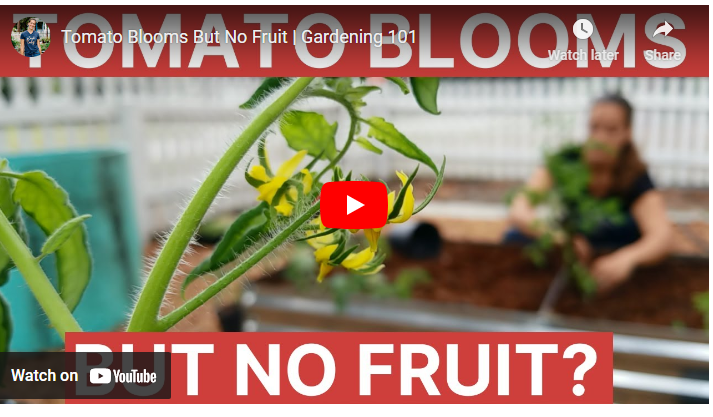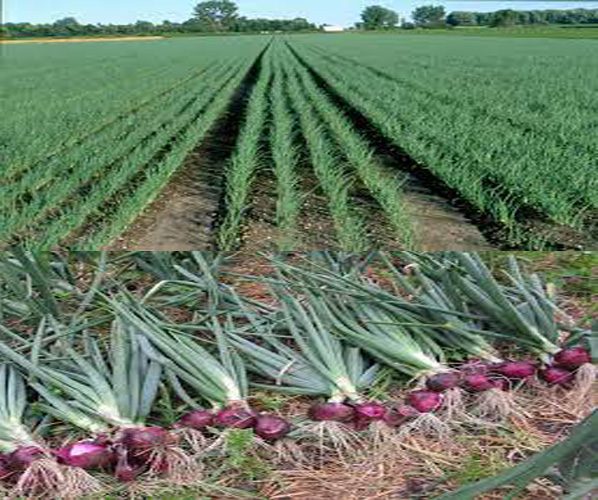Have you been eagerly waiting for your tomato plants to bear fruit, only to be disappointed by their lack of productivity? It can be frustrating when your tomato plants seem healthy and robust, yet they fail to produce any fruits.
The lack of fruit production in tomatoes can be attributed to various factors. Common reasons include inadequate pollination, extreme temperatures, nutrient deficiencies, improper pruning, or the presence of pests or diseases. Identifying and addressing these issues can help encourage fruit set and improve tomato yield.
There are several factors that can contribute to this issue, and in this article, we will explore the reasons why your tomato plants may not be bearing fruit and provide practical solutions to help you address the problem.
Why Is My Tomato Not Bearing Fruits: What To Know & Do
Tomatoes are among the most popular plants grown in home gardens, prized for their juicy and flavorful fruits. However, it can be disheartening when your tomato plants fail to produce any fruits despite your best efforts. Understanding the reasons behind this problem can help you take appropriate measures to ensure a bountiful tomato harvest.
To comprehend why your tomato plants may not be producing fruit, it’s essential to grasp the growth cycle of tomato plants. Tomato plants typically go through several stages, including seed germination, vegetative growth, flowering, and fruiting. The fruiting stage is the most crucial phase when you can expect to see tomatoes on your plants.
Insufficient Pollination
One common reason for tomatoes not bearing fruit is insufficient pollination. Tomatoes require proper pollination to set fruit, and this process is often facilitated by bees and other pollinators. If your garden lacks pollinators or if weather conditions are unfavorable for pollination, your tomato plants may not produce fruits.
To address this issue, consider attracting pollinators to your garden by planting flowers or using techniques such as hand pollination.
Environmental Conditions
Environmental conditions play a vital role in tomato fruit set. Temperature extremes, particularly during the flowering stage, can hinder fruit production. High temperatures above 90°F (32°C) can cause flowers to drop without setting fruit.
On the other hand, cold temperatures below 55°F (13°C) can negatively impact pollination and fruit development. Aim for consistent temperatures between 70°F and 85°F (21°C and 29°C) to encourage fruiting.
Nutritional Deficiencies
Tomatoes require a balanced supply of essential nutrients to produce healthy fruits. Nutritional deficiencies can lead to poor fruit set or a complete lack of fruit. Common deficiencies that affect fruiting include nitrogen, phosphorus, and potassium deficiencies.
Conduct a soil test to identify any nutrient imbalances and amend the soil accordingly with organic fertilizers or compost to provide the necessary nutrients for your plants.
Improper Pruning Techniques
Pruning is an essential practice for tomato plants, but improper pruning techniques can hinder fruit production. Excessive pruning, particularly the removal of too many leafy branches, can limit the plant’s ability to produce energy through photosynthesis, resulting in fewer fruits. Avoid excessive pruning and focus on removing only the necessary branches to maintain a balance between foliage and fruit production.
Disease and Pest Issues
Disease and pest problems can also prevent your tomato plants from bearing fruit. Common diseases like blossom end rot, blight, and wilt can affect fruit development. Pests such as aphids, tomato hornworms, and whiteflies can also cause damage to the plants.
Implement proper pest and disease management strategies, including regular inspections, appropriate treatments, and the use of resistant tomato varieties to protect your plants from these issues.
Inadequate Watering
Inadequate watering can have a significant impact on fruit production in tomato plants. Insufficient moisture can lead to blossom drop, where the flowers fall off before setting fruit. On the other hand, overwatering can cause root rot and other water-related diseases. Maintain consistent soil moisture by watering deeply and regularly, allowing the soil to dry slightly between watering sessions.
Overcrowding of Plants
Tomato plants need adequate space to grow and thrive. Overcrowding can lead to competition for resources, including sunlight, nutrients, and water, which can hinder fruit production. Ensure proper spacing between tomato plants, allowing for good air circulation and ample room for each plant to develop and bear fruit.
Improper Planting Depth
Planting your tomatoes at an incorrect depth can also affect their ability to produce fruits. If planted too deep, the plant may focus more on root development than fruit production. Conversely, if planted too shallow, the plant’s roots may not establish properly, leading to poor overall growth. Plant your tomatoes at the appropriate depth, burying the stem up to the first set of leaves for optimal fruiting.
How to Fix Blossom Drop on Tomatoes:
Blossom drop, where tomato flowers fall off without setting fruit, can be frustrating for gardeners. To fix this issue, consider the following steps:
Ensure proper pollination: Lack of pollination is a common cause of blossom drop. Encourage pollinators like bees by planting flowers nearby or hand-pollinate the flowers yourself using a small brush.
Maintain optimal temperature: High temperatures above 90°F (32°C) can cause blossom drop. Provide shade or use shade cloth to protect the plants during hot weather. Avoid planting tomatoes too early in the season when temperatures are still unpredictable.
Consistent watering: Inconsistent watering can lead to blossom drop. Water deeply and regularly, ensuring the soil is evenly moist. Avoid overwatering, as it can cause other issues like root rot.
Nutrient balance: Imbalances in essential nutrients can contribute to blossom drop. Conduct a soil test and provide balanced fertilization according to the plant’s needs. Ensure sufficient phosphorus and potassium levels for healthy flower and fruit development.
Proper pruning: Excessive pruning can remove too many leaves, reducing the plant’s ability to produce energy for fruit development. Prune only necessary branches and maintain a balance between foliage and fruit-bearing branches.
Brandywine Tomato Not Setting Fruit:
If your Brandywine tomato plants are not setting fruit, consider the following tips:
Check pollination: Ensure proper pollination by providing a conducive environment for pollinators or manually pollinating the flowers. Brandywine tomatoes are large, and their flowers may require additional attention for effective pollination.
Optimize growing conditions: Brandywine tomatoes thrive in warm temperatures and full sun. Ensure they receive at least 6-8 hours of direct sunlight daily. Provide consistent watering and avoid extreme temperature fluctuations.
Nutrient management: Monitor soil fertility and provide appropriate nutrients. Brandywine tomatoes benefit from a balanced fertilizer with higher phosphorus and potassium levels for improved fruit set.
Avoid excessive nitrogen: Excessive nitrogen can promote lush foliage growth at the expense of fruit production. Maintain a balanced nitrogen-to-potassium ratio to encourage fruiting.
Why Do My Tomato Plants Have Flowers but No Tomatoes?
If your tomato plants have plenty of flowers but no fruits, consider the following reasons:
Lack of pollination: Inadequate pollination can result in flowers dropping without setting fruit. Encourage pollinators or manually pollinate the flowers using gentle shaking or a small brush.
Environmental conditions: Extreme temperatures, particularly high heat, can cause flowers to drop. Aim for consistent temperatures between 70°F and 85°F (21°C and 29°C) to support fruit development.
Nutritional imbalances: Nutrient deficiencies or imbalances can affect fruit set. Conduct a soil test and provide balanced fertilization, paying attention to phosphorus and potassium levels.
Improper pruning: Excessive pruning can reduce the plant’s ability to produce energy for fruit development. Prune selectively, removing only necessary branches.
Varietal characteristics: Some tomato varieties naturally have a higher rate of flower drop. If this is the case, consider choosing different varieties that are known for better fruit production.
How Do I Get My Tomato Plants to Produce Fruit (Including Heirloom Tomatoes)?
To encourage fruit production in tomato plants, including heirloom varieties, follow these steps:
Provide optimal growing conditions: Plant tomatoes in a sunny location with well-draining soil. Ensure they receive at least 6-8 hours of direct sunlight daily. Maintain consistent moisture levels by watering deeply and regularly.
Pollination: Create a pollinator-friendly environment or manually pollinate the flowers using gentle shaking or a small brush.
Nutrient management: Conduct a soil test to determine nutrient deficiencies or imbalances. Provide balanced fertilization, paying attention to phosphorus and potassium levels.
Pruning and training: Prune selectively to maintain a balance between foliage and fruit-bearing branches. Use appropriate support structures to train the plants and promote better air circulation.
Disease and pest control: Monitor and manage common tomato diseases and pests to prevent damage that could hinder fruit production. Consider using organic pest control methods or resistant tomato varieties.
Remember that different tomato varieties may have specific requirements, including heirloom varieties. Follow the specific care instructions provided for each variety to maximize fruit production.
How long does it take for a tomato plant to bear fruit?
Tomato plants typically take around 55 to 80 days from planting to the first harvestable fruits, depending on the variety.
Can I use artificial pollination methods for my tomato plants?
Yes, you can use artificial pollination methods such as gently shaking the flowers or using a small brush to transfer pollen between flowers.
Is it necessary to prune tomato plants for fruit production?
While pruning can be beneficial for airflow and disease prevention, it is not always necessary for fruit production. Pruning decisions should be based on the specific needs and characteristics of your tomato variety.
What are some common tomato diseases that can affect fruiting?
Common tomato diseases that can impact fruit development include blossom end rot, blight, wilt, and powdery mildew.
How often should I water my tomato plants?
Tomato plants generally require about 1 to 1.5 inches of water per week, depending on weather conditions. It’s important to water deeply and ensure proper drainage to prevent water-related issues.
Conclusion
If you find yourself wondering, “Why is my tomato not bearing fruit?” consider the various factors discussed in this article. From insufficient pollination to environmental conditions, nutritional deficiencies, pruning techniques, disease and pest issues, watering practices, overcrowding, and improper planting depth, there are several potential reasons behind the lack of fruit production.
By understanding these factors and implementing the suggested solutions, you can increase the chances of a successful tomato harvest.




